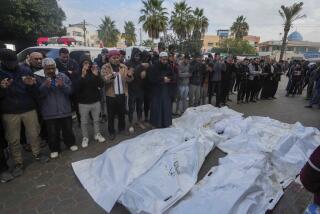India’s Leader Visits Disputed Kashmir
- Share via
SRINAGAR, India — Prime Minister Manmohan Singh made his first visit as India’s leader to the disputed Kashmir region today and offered to hold unconditional peace talks with any separatists who would shun violence.
But a moderate separatist leader expressed disappointment at the invitation, which came as India began a limited troop withdrawal from the region.
“My brothers and sisters, my doors are open to all those who are ready to talk to me peacefully,” Singh said from behind a wall of bulletproof glass and steel plate here in the summer capital of India’s Jammu and Kashmir state.
“My heart is open to new ideas — if they are based on honesty and truthfulness,” the prime minister added. “With these new ideas, we might move forward and live a dignified life.”
Singh, who took office in May, made the offer in a speech at a cricket field just hours after Indian troops fought and killed two militants holed up a few hundred yards from the stadium.
A moderate leader of a loose coalition of Kashmiri separatists, called the All Party Hurriyat Conference, said Kashmiris were disappointed because Singh did not offer specific solutions to the 57-year conflict over Kashmir.
Maulana Abbas Hussain Ansari, former chairman of the Hurriyat’s moderate faction, also wasn’t impressed by Singh’s decision to begin withdrawing thousands of troops today.
“People expected a political package and not just the reduction of occupying forces,” Ansari said in an interview. “The number of troops does not matter much. What matters is how they behave with the people. So they should be directed to act as security forces, not as occupying forces.”
Indian officials say there are about 250,000 soldiers in Jammu and Kashmir state. But according to neighboring Pakistan, the combined army and paramilitary police forces number closer to 700,000.
Last week, Singh ordered the troop reduction as another step in the peace process with Pakistan. But he did not say how many troops eventually will be withdrawn. Local reports, quoting anonymous sources, put the figure at anywhere from 9,000 to 40,000 soldiers.
Pakistan controls a portion of the disputed region. Muslims make up a majority of the restive population in Kashmir, as they do in Pakistan; most Indians are Hindu. Conflicts over the region have triggered two wars between the two nations.
Singh has warned that the troop reduction is only an experiment and that the soldiers will be sent back in if Pakistani President Pervez Musharraf does not keep a promise to prevent militants from infiltrating Indian-controlled territory from the area Pakistan controls.
The first several hundred soldiers to withdraw today left the Anantnag district in southern Kashmir, where the level of militant activity is relatively moderate.
Separatist militants greeted Singh’s goodwill mission with a dawn assault just a few hundred yards from where the Indian leader spoke in the afternoon.
As hundreds of troops cordoned off the area in advance of Singh’s rally, two guerrillas took cover in a half-built house on a low hill overlooking the stadium. They opened fire on Gophkar Road, which runs past the state governor’s home and an office for the United Nations’ military observer mission.
Hurling hand grenades and firing more than 100 rounds from their assault rifles, the militants battled scores of Indian troops for several hours.
By 10.50 a.m., just over an hour before Singh was scheduled to speak, Indian forces had the militants surrounded. One guerrilla shouted “Allahu Akbar” (God is great) just seconds before the pair were killed in a hail of gunfire.
The previous Indian government, led by former Prime Minister Atal Behari Vajpayee, launched the current effort to bring peace to Kashmir last year. The Indians held two rounds of peace talks with Hurriyat leaders.
The separatist group’s current chairman, Mirwaiz Omar Farooq, declined to comment today on Singh’s offer of more talks until the separatist group’s executive meets Thursday to discuss its next move.
But on the eve of Singh’s two-day visit to Jammu and Kashmir, Farooq said Hurriyat leaders would not agree to a third round of talks until they get passports and permission to visit Pakistani-held territory.
“We want to talk to the Kashmiri leadership there,” Ansari, the former chairman, said today. “Kashmir is divided in two parts, by a line of blood. We want to visit the other side of Kashmir to reach a consensus.”
Singh dismissed that demand, saying at a news conference: “We are not putting preconditions and we do not expect anyone else to put preconditions on talking to us.”
Musharraf, who also command’s Pakistan’s military, recently suggested to gathering of reporters and diplomats that solutions to the Kashmir conflict might include autonomy for the territory or joint rule by India and Pakistan over parts of it.
Singh said he knows little about the proposal because it has not been formally presented at bilateral talks. Pakistani Prime Minister Shaukat Aziz may do so when he visits New Delhi next week, but Singh repeated the position of successive Indian governments: that Kashmir belongs to India.
“I have stated quite clearly that any redrawing of international borders is something that is not going to be acceptable to us,” Singh told reporters. “I’ve also made it quite clear to General Musharraf, and everybody else, that any proposal which smacks of the further division of our country on the basis of religion is not going to be acceptable to us.
“Within these two limits, we are ready to look at any proposals that may be put on the table,” Singh added.
More to Read
Sign up for Essential California
The most important California stories and recommendations in your inbox every morning.
You may occasionally receive promotional content from the Los Angeles Times.










